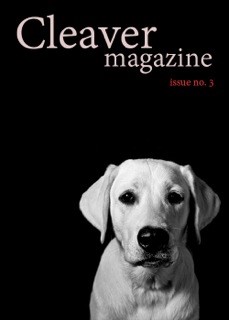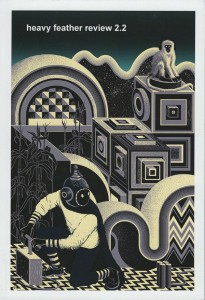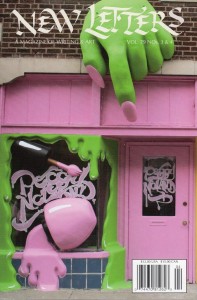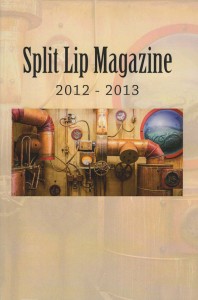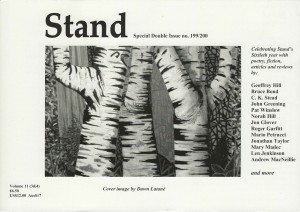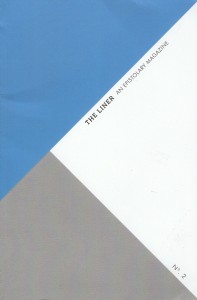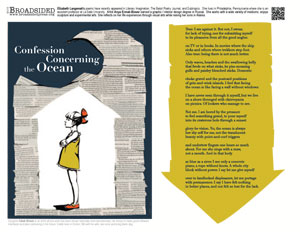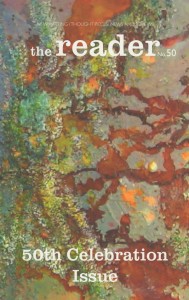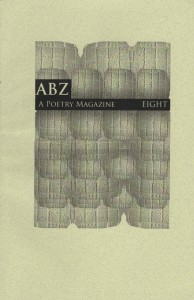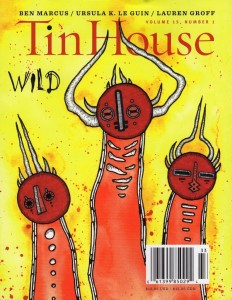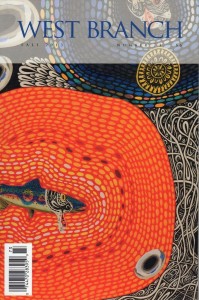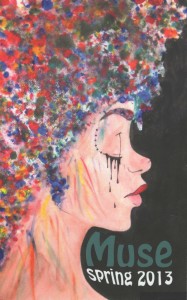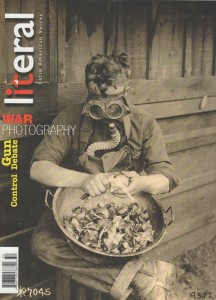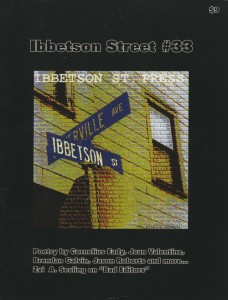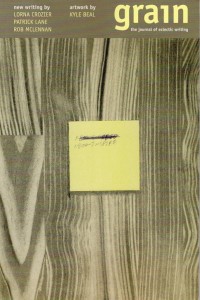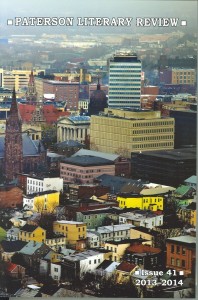The Southern Review is published by Louisiana State University and has a long-standing literary tradition dating back to 1935. It seeks to find work that pays careful attention to craftsmanship and technique and to the seriousness of the subject matter. The most recent issue is indeed a finely crafted publication that starts strong and remains so throughout. This issue is packed with fiction, nonfiction, poetry, and the art of Patricia Spergel. Continue reading “The Southern Review – Summer 2013”
NewPages Blog
At the NewPages Blog readers and writers can catch up with their favorite literary and alternative magazines, independent and university presses, creative writing programs, and writing and literary events. Find new books, new issue announcements, contest winners, and so much more!
Versal – 2013
It could be said that all surrealists are alike, but all nihilists are unhappy in their own ways. Fortunately for readers of this journal, it is sometimes hard to separate the two philosophies, which leads to astonishing feats of dreams and poignant detail, a crash course in the world by an impressive new wave of international literati. Continue reading “Versal – 2013”
Spread the word!
Whiskey Island – 2013
Whiskey Island is the literary magazine of Cleveland State University, and, according to their website, the name comes from a neighboring peninsula that has gone through several metamorphoses over the years: “it has been a dump, a US Coast Guard Station, a ship graveyard, and a predominantly Irish immigrant shanty town.” This peninsula now shares the name with a magazine that is rich with strong fiction and poetry. Continue reading “Whiskey Island – 2013”
Spread the word!
Lit Mag Covers :: Picks of the Week
Here’s the magazine covers that popped out at me this week. We’ve got a puppy, an eye-tantalizing, geometric design, and a large green hand with pink fingernails. What more could I ask for?
Cleaver Magazine‘s “Literature & Art Go Back to School” issue. You can read it online for free.
Heavy Feather Review‘s Volume 2 Number 2, with cover images by Sam Chiver. Available in print subscription or as an e-pub.
New Letters‘ cover image is by Peggy Noland. See the full image on the back of the issue as well.
Spread the word!
Special Photography Issue
Poetry Northwest‘s Spring/Summer 2013 issue is a special photography issue with photography by Doug Keyes, Nance Van Winckel, and Dianne Kornberg. There is also a special feature on the works of Mary Randlett which includes rare photos from Theodore Roethke’s last days.
“This issue also features the distinctive section, Film Roll: An Expose in 24, curated by contributing editor Andrew Zawacki, examining the intersection of poetry & photography. Included are pieces by C.D. Wright, Sharon Olds, John Yau, Paisley Rekdal, Joshua Edwards, Martha Ronk, Susan Wheeler, as well as many others.”
Spread the word!
CFS :: Diversity Art Exhibit
Embracing Our Differences invites art submissions for its 11th annual outdoor art exhibit celebrating diversity. National and international submissions are encouraged. Thirty-nine artists will be selected for the exhibit. The Exhibit will be displayed April and May 2014 at two venues – Island Park along Sarasota, Florida’s beautiful bayfront and Riverwalk in Bradenton, FL. Since 2004, the exhibit has been viewed by more than 1,600,000 visitors.
Final selections will be chosen based on artistic excellence in reflection of the theme “embracing our differences” and made by a three-judge panel of professional artists, curators and art professionals. A total of $3,000 (US) in awards will be presented. There is no submission fee nor limit on the number of entries. Submissions must be postmarked no later than January 6, 2014.
Spread the word!
CFP BOSS: Biannual Online-Journal of Springsteen Studies
BOSS: The Biannual Online-Journal of Springsteen Studies is a new open-access academic journal that publishes peer-reviewed essays pertaining to Bruce Springsteen. Springsteen’s immense body of work and remarkable musical career has inspired a recent outpouring of scholarly analysis. BOSS will create a scholarly space for Springsteen Studies in the contemporary academy. The editors seek to publish articles that examine the political, economic, and socio-cultural factors that have influenced Springsteen’s music and shaped its reception. The editors of BOSS welcome broad interdisciplinary and cross-disciplinary approaches to Springsteen’s songwriting, performance, and fan community, as well as studies that conform to specific disciplinary perspectives.
Please submit articles between 15 and 25 pages that conform to The Chicago Manual of Style to Springsteenstudies at gmail.com by January 1st, 2014. Authors will be notified of acceptance by March and the first issue of BOSS will be published in June, 2014, which marks the thirtieth anniversary of the release of Born in the U.S.A.
Contact: Please address all inquiries to Jonathan D. Cohen (Managing Editor) at Springsteenstudies at gmail.com
Spread the word!
Shamelessly Help Sell Books!
Sherman Alexie is encouraging authors to volunteer to help sell books in a movement called Indies First. The Saturday after Thanksgiving, dubbed Small Business Saturday, Alexie wants authors to volunteer at local bookstores to shamelessly self-promote their own books, friends’ books, favorite books – and, ultimately, help out the indie bookseller. Booksellers looking to this new approach to hand-selling can sign up on the American Booksellers Association website and find a volunteer match. Alexie himself spent a day as “bookseller-for-a-day” for a Seattle bookstore re-opening in April. Knowing how well it worked, he wants to encourage more participation, and the ABA is willing to help organize these grassroots efforts.
Spread the word!
Versal on Hiatus
Versal, the go-get ’em lit mag from Amsterdam, the Netherlands has announced it will be taking “an intermission.” I’ve been impressed with the Versal staff over the years, their high energy approach to AWP gave me a glimpse into what they must give to the publication on a daily basis. They also recently began developing a more systematic business approach to their work, involving a consultant and sharing during panel presentations their ‘lessons learned’ so that other publications might benefit and learn to thrive rather than just survive. So, it’s with some surprise that this information came across my e-mail, but also with great hope for Versal that this ‘intermission’ will help them do exactly as they note, and allow them to come back as the model powerhouse they had become. My best to the Versal staff!
From the Versal Staff:
Versal released our 11th issue in May to critical acclaim. Our 11th issue means we’ve been on the scene for 11 amazing years, curating the best prose, poetry, and art from practitioners around the world, for an international audience.
With that many years under our belt, we’ve seen and learned a lot. The literary landscape has changed drastically since we published our first issue back in 2002.
We’ve changed as well.
Where we’re going
We’re eager to improve the way we do things–logistically and conceptually. This means retiring old processes and moving over to better ways of running a journal and exploring projects we’ve had on the backburner.
To give ourselves breathing room for these exciting new developments we’ve decided to go on a sabbatical of sorts, pausing the release of the next issue of Versal and therefore its reading period. We’ll make an announcement as soon as we’re ready to begin reading for issue 12.
All of our subscribers will receive an email detailing options regarding their subscriptions.
What to expect this year
Though we’re not producing an issue right now, we are continuing to put on events in Amsterdam and elsewhere. Watch our Twitter and Facebook page for news, including announcements regarding This is Not a Reading Series and our Journal Porn event in Seattle at AWP!
So, keep writing, creating, and keep in touch. We’ll be back with Versal 12 recharged, rebooted, and better than ever.
Spread the word!
Picturing the Personal Essay
In Creative Nonfiction‘s latest issue, devoted to survival stories, is Tim Bascom’s “Picturing the Personal Essay: A Visual Guide.” Comparing the writing process and form to diagrams, Bascom explains that “the remarkable thing about personal essays . . . is that they can be so quirky in their ‘shape.’ No diagram matches the exact form that evolves, and that is because the best essayists resist predictable approaches.” However, he says that understanding some basic structures can help create a new form. He then goes on to explain different structures: narrative with a lift, the whorl of reflection, the formal limits of focus, dipping into the well, and braided and layered structures.
Also in this issue are stories of survival about a plane crash, a drug trip, a drowning, a search for a missing woman, and a man on the tracks before an oncoming train.
Spread the word!
Ann Crispin
Ann Crispin, author and co-founder of Writer Beware, died Friday, September 6 after a two-year struggle with cancer. She posted on Facebook on Sept. 3:
I’ve been hesitant to make this post, but it’s time. I want to thank you all for your good wishes and prayers. I fear my condition is deteriorating. I am doing the best I can to be positive but I probably don’t have an awful lot of time left. I want you all to know that I am receiving excellent care and am surrounded by family and friends. I wish all aspiring writers the will to finish and a good contract. Please continue to monitor Writer Beware and be careful who you sign with. Victoria Strauss and Richard White are there to help.
Thank you Victoria and Richard – and to Ann, for all she has done. Writer Beware is an essential resource for writers; our heartfelt sorrow for your loss. I will definitely continue to honor Ann by letting our readers know about Writer Beware. Thank you.
Spread the word!
Lit Mag Covers :: Picks of the Week
Here, my friends, are some magazines that came in this week whose covers I simply had to share. There’s a crying shark in a pink dress, a dead horse and a staring girl, and the Philosophers’ Rock in Austin, TX.
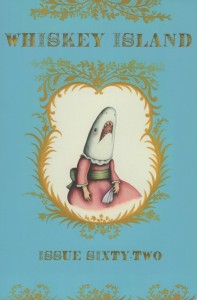 |
Whiskey Island |
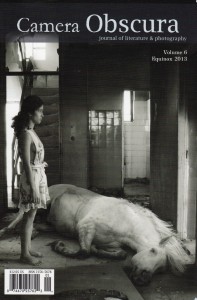 |
Camera Obscura |
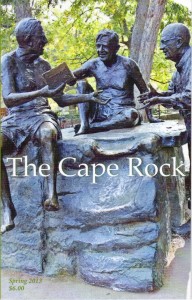 |
The Cape Rock |
Spread the word!
Split Lip Year Anthology
Online Split Lip Magazine has just put forth their first print collection, with writing from 2012-2013. Featured in the print publication are Jared Yates Sexton, Michael Martone, Danielle E. Curtis, Keith Rebec, Jenny Halper, Meredith Turits, Genevieve Hudson, Sean Lovelace, and more.
Spread the word!
CFP: Excellent Undergraduate Work Related to Civil Rights and Race
The peer-reviewed undergraduate journal Queen City Writers seeks submissions for the spring 2014 issue themed around civil rights and race relations. The issue will honor 2013, which marks several anniversaries related to the American Civil Rights Movement. These include: 1863—President Lincoln issued the Emancipation Proclamation; 1868—The Fourteenth Amendment to the Constitution defined citizenship and nullified the Dred Scott Case; 1963—Martin Luther King Jr. penned his “Letter from Birmingham Jail” and made his “I Have a Dream” speech; 1968—Martin Luther King Jr. was assassinated and President Johnson signed the Civil Rights Act; 2008—Barack Obama became the first African-American elected to President of the United States, and was inaugurated for a second term in 2013.
Possible questions to consider include, but are not limited to:
● How are prominent historical figures represented rhetorically in current and popular culture (i.e., Abraham Lincoln in the recent film Lincoln)?
● In what ways are the ideas in Martin Luther King’s texts and speeches still relevant in contemporary conversations and struggles regarding civil rights?
● How has protest rhetoric, and the circumstances that called for it, evolved since the 1960s?
● How have civil rights expanded to include other racial and ethnic identities and causes, and in what ways are these expansions indebted to the Civil Rights Movement and other efforts to carve out new definitions of “civil rights”?
● Do you have a personal experience related to your own literacy and civil rights or race relations?
● What complexities exist in the relationships between voting, rights, and citizenship, particularly in light of the Supreme Court’s decision to strike down the Voting Rights Act?
● What role do social media, and visual and multimedia texts play in conversations about civil rights?
Queen City Writers publishes undergraduate essays and multimedia works related to our focus on writing, rhetoric, reading, literacy, popular culture and media, community discourses, and multimodal and digital composing. For a full explanation of our focus and submission guidelines, please see: http://qc-writers.com/submissions/. For the spring issue, submissions will be considered through early December.
Spread the word!
Standing for 60 Years
Stand magazine puts forth a special double issue (199/200) to mark their sixtieth year publishing. It was started in 1952 by Jon Silkin after he had received
Spread the word!
Epistolary Magazine of Writing and Art
In their second issue, the staff of The Liner says that the magazine has honed on it’s identity: “We’ve always loved correspondences, with a particular interest in those of writers and artists, so with this issue we’re launching our new identity as an epistolary magazine of writing and art. Sometimes sending a piece of mail feels like a great act of faith: so much trust is placed upon the postal service with an item which likely has no duplicate in this world. If it is lost, it is gone for good, and yet somehow it usually reaches its destination, even if it takes a while,” writes Editor Gloria Kim.
This issue features Mustafa Abubaker, Neelanjana Banerjee, Morgan Blair, Matt Craven, Sean Dougherty, Romesh Gunesekera, David Jien, Marian Kilcoyne, Andrew Knauer, Elizabeth O’Brien, Allen Sweat, Marissa Textor, Paul Wackers, and Noah Wilson.
Spread the word!
September Broadside
September’s Broadsided Press Collaboration, “Confession Concerning the Ocean” features a poem by Elizabeth Langemak, art by Anya Ermak-Bower, and design by Caleb Brown. This is the first time Broadsided has included a “guest designer” in the mix; previous broadsides had been designed by Broadsided Founder Elizabeth Bradfield.
Edited by Elizabeth Bradfield, Gabrielle Calvocoressi, Sean Hill, Alexandra Teague, and Mark Temelko, Broadsided has been putting literature in the streets since 2005. Each month, a new broadside is posted both on the website and around the nation.
Writing is chosen through submissions sent to Broadsided. Artists allied with Broadsided are emailed the selected writing. They then “dibs” on what resonates for them and respond visually – sometimes more than one artist will respond offering a selection of broadsides.
Broadsided Vectors can download the poem in full color or black and white and poster it around town, campus, wherever! Check into becoming a Broadsided Vector today!
Spread the word!
50th Celebration Issue
“Fifty issues, sixteen years: it feels like an achievement for what is generically labelled a ‘little’ magazine,” writes Editor Philip Davis in the 50th issue of The Reader. Inside the issue, the editors give what they deem as the finest writing from their past issues including pieces from Doris Lessing, Simon Barnes, Patrick McGuinness, Raymond Tallis, Carol Rumens, and Howard Jacobson.
There is also a selection of new writing from Blake Morrison ,Connie Bensley, Les Murray, Philip Jupitus, Ian McMillan, Michael Stewart, Sian Davis, and more.
Spread the word!
ModPo Free Online Class
The Kelly Writers House is hosting a free, open, non-credit online course (via Coursera) Modern & Contemporary American Poetry taught by Al Filreis, University of Pennsylvania. “ModPo is a fast-paced introduction to modern and contemporary U.S. poetry, from Dickinson and Whitman to the present. Participants (who need no prior experience with poetry) will learn how to read poems that are supposedly ‘difficult.'” It begins on September 7, 2013.
Spread the word!
ABZ Goes Biennial
ABZ Poetry Magazine announces in their latest issue (#8) that they will no longer publish annually and instead move to a biennial publication cycle. “Poems for Issue Nine will be read in 2015,” it says.
The current issue, however, features Priscilla Atkins, Jan Ball, John F. Buckley, Rick Campbell, Bruce Cohen, Geraldine Connolly, Mark DeFoe, Richard Hague, Lola Haskins, William Jolliff, Charles Nutter Peck, Rachael Peckham, Kenneth Pobo, Charles Rammelkamp, Daniel Saalfeld, Steve Scafidi, Ciara Shuttleworth, Red Shuttleworth, Richard Spilman, Charles Stacy, Slobodanka Strauss, Stephen Sundin, Melissa Tuckey, Mitchell Untch, and Arne Weingart. Read up; it’ll be two years until you get another.
Spread the word!
Photography Competition
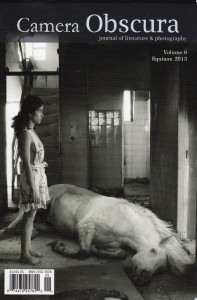 Camera Obscura‘s Equinox 2013 issue features the winners of their photography competition. The editors write, “The breadth of skill and artistic diversity made deciding a winner in this competition a unique challenge for all involved.”
Camera Obscura‘s Equinox 2013 issue features the winners of their photography competition. The editors write, “The breadth of skill and artistic diversity made deciding a winner in this competition a unique challenge for all involved.”
Outstanding Professional Photography Award
Nude Meaning by Omer Chatziserif
Editor’s Choice Award for Professional Photography
Untitled (horse) by Saeed Rezvanian (featured on the cover)
Professional Photography Honorable Mention
In Search Of by Christopher Ruane
Auschwitz No 14 by Cole Thompson
The Collective by Micahel Bilotta
Outstanding Amateur Photography Award
Riddles In the Dark by Michael Bilotta
Editor’s Choice Award for Amateur Photography
Tree Reflection by Daniel Butcher
Amateur Photography Honorable Mention
The Line by Goran Jovic
Rain Boy by Goran Jovic
Also in this issue is prose from Sarah Scoles, Jacqueline Kolosov, Ricardo Nuila, Julie Lekstrom Himes, Gail Hosking, Eric Magnuson, Stephanie MacLean, Barrett Bowlin, and Jael Montellano.
Spread the word!
Lake Superior
Once upon a time the young Basil Bunting came across a succinct expression of a central concept in his own poetic practice which Ezra Pound quickly promulgated as a crystalline slogan of the Modern era: “dichten = condensare”—‘to compose poetry is to condense.’ Perhaps no other poet’s work sets a clearer, finer example of this than Lorine Niedecker. As she states in her rather infamously well-known poem “Poet’s Work,” her grandfather advised her to “learn a trade” and she Continue reading “Lake Superior”
Spread the word!
Butch Geography
As soon as I saw the title of Stacey Waite’s first full-length book, Butch Geography, I was reminded of a line from the poem “Solar” by Robin Becker: “The desert is butch.” Unsurprisingly, Waite uses this line as an epigraph for the book’s title poem. However, while Becker’s poem focuses largely on the geography of landscape, Waite’s book concerns itself prominently with the intimate geography of the gendered body and its relationship to the world and to others. Continue reading “Butch Geography”
Spread the word!
The Witches of Ruidoso
“The earth is much like a train with a destination unknown,” Beth Delilah tells boyfriend Elijah in The Witches of Ruidoso. Sadly, author John Sandoval’s journey ended with his death in 2011, making this his first and only novel. His bittersweet YA romance showed promise of him becoming an original storyteller. Continue reading “The Witches of Ruidoso”
Spread the word!
The Exchange
“Poetry is my way to understand what is difficult. How one thing can be explained through another—is to get closer, to unhide what feels hidden,” explained poet Sophie Cabot Black in an interview last year with The New Yorker. The Exchange, Black’s third collection of poetry, delves into deeply difficult subjects, primarily the loss of a beloved friend to leukemia—poet Jason Shinder, author of Stupid Hope (Graywolf Press, 2009). Like Black’s previous two collections, the poems in The Exchange render their speakers’ worlds in tight descriptions rich with the play of a quick mind. In The Exchange, the realm of finance and the Biblical story of Abraham’s willingness to sacrifice his son Isaac additionally play central roles, expanding the book’s lexicon of loss, gain, and worth. Using these three strands, Black crafts a cohesive collection of tightly woven, ruthlessly examining poems. Continue reading “The Exchange”
Spread the word!
On Sal Mal Lane
Sri Lankan writer Ru Freeman’s novel On Sal Mal Lane is an intense, in-depth portrayal of the years leading up to the Tamil Tigers’ demands for their own homeland and the chaos of that year, 1983. It focuses, however, on the children of a lane (not inside the capital of Colombo) and their playing and alliances with neighbors of different sects—Sinhalese, Buddhist, Catholic, Muslim, and Burgher, as well as Tamils. With Tamils often wealthier than the others and Sinhalese often the poorest, the prejudice in the neighborhood is particularly against the Tamils. One main example here is a bully Sinhalese child, not recognizing his family’s mixed lineage, who fatefully hates his Tamil uncle. Conversely, two of the child protagonists make strong and unlikely alliances with individual Tamil neighbors. Thus the lane provides a microcosm of the outer society’s tensions, with the writer frequently warning us of trouble to come. This dead-end lane will not be left unscathed. Continue reading “On Sal Mal Lane”
Spread the word!
Gathering Noise from My Life
In his author’s note at the beginning of his book, Donald Anderson writes: “I concern myself in this book with matters of war, race, religion, memory, illness, and family, sources of humor and horror. And: boxing, which has been reported in literature from Homer on.” This diverse list prepares the reader for the book’s numerous intersecting threads of themes and topics. Boxing stands alone here, because in addition to being a theme for rumination, its images of bobbing and weaving, punching and ducking describe the book’s structure. As the title suggests, this memoir is not a linear narrative but a chronological series of memories, quotes, and data, some related and some seemingly random, that trace the writer’s life from his birth in Butte, Montana in 1946 to his current life as director of the creative writing program at the U. S. Air Force Academy in Colorado. Continue reading “Gathering Noise from My Life”
Spread the word!
All of You on the Good Earth
Ernest Hilbert’s second collection of poetry, All of You on the Good Earth, is an enlightening example of the revival of the sonnet. The poems are intelligent, topically indulgent, and extremely well crafted. The sonnets are capsules, compressing large ideas or expanding small ones, lined up in equal measure. Continue reading “All of You on the Good Earth”
Spread the word!
Meaty
When I received my copy of Meaty at an event for the ALA conference, I knew I was in for a different kind of reading experience. She signed my copy with fair warning that she likes writing dirty messages: “your vagina smells amazing. love, Samantha.” This is just a small sampling of the type of writing that you’ll see in her essays. Creator of the blog “Bitches Gotta Eat,” Samantha Irby tells it like it is, whether through the gritty details of her Crohn’s disease or through her unfiltered rantings of men and sex. It is written very informally, following the aesthetic of her blog, and inviting readers in as if Irby is personally conveying her stories and thoughts to them. Continue reading “Meaty”
Spread the word!
The Night of the Rambler
The Night of the Rambler is true to its title. It tells a story of a revolution rambling with plans on how to execute a coup d’état on a young government, perhaps too young to transform and reconfigure policies inherited from previous colonial administrations. The transition is mired with problems, which is not unusual: young governments in newly decolonized territories are still learning the ropes of being free. Like youth itself, these fledgling states are high on new-found independence or semi-independence. In this novel, that mindset disables effective government. A territory that such a state governs feels neglected and excluded from basic benefits and services. Ironically, here, the lack of organized surveillance through bureaucratic standards—which gave colonial administrations immense control—becomes a form of oppression: political marginalization, a loss of sovereignty that opens channels for organized protests. However, there is a twist in the revolution Montague Kobbé has fictionalized, which is not necessarily in the protest itself, but what it wants in the end: it prefers direct administration from its original colonizer. Continue reading “The Night of the Rambler”
Spread the word!
You are Everything You are Not
You are Everything You are Not represents the conclusion of John High’s lyric narrative trilogy of books he began with Here and A Book of Unknowing. The characters of a mute girl and one-eyed boy return, joining in with a circus man, blind monks, ghosts, and assorted unspecified masters in a journey more spiritual than psychological, across an un-named landscape of trees, wind, streams and rivers, which often brings to mind Ingmar Bergman’s The Seventh Seal. Or, as Christopher Sawyer-Lauçanno describes it in his preface, “a realm as magically realistic as any found in a García Márquez novel.” Continue reading “You are Everything You are Not”
Spread the word!
The Moral Life of Soldiers
The Moral Life of Soldiers is a collection of five stories (one novella-length) and a novel that fans of author Jerome Gold might recognize from previously published collections, such as Of Great Spaces and Prisoners. This collection is told from the perspective of an older soldier, Paul Donaldson, taking stock of his life and his experiences in the Vietnam War. The organization of the stories speaks to Jerome Gold’s commitment to the practical means of arranging the pieces—favoring a series of myopic encounters of ambiguous moral distinction rather than a longue durée quasi-biographical story of his main character. Continue reading “The Moral Life of Soldiers”
Spread the word!
Young Tambling
Kate Greenstreet, painter, graphic artist, and poet, has published two previous books of poetry with Ahsahta Press: case sensitive (2006) and The Last 4 Things (2009). The back cover of Young Tambling, her third outing, is stamped “Based on a true story.” Fittingly, the first of its six sections, “Narrative,” begins with a retelling of Young Tambling, a Scottish ballad wherein the hero is not Tam or Tambling or Tom Line. Instead, the story belongs to the girl telling it, driving it: “for once, the hero is the girl and her point of view and actions are primary.” This story frames the mixed-genre artist’s memoir; also serving as a frame are epigraphs, each of which is printed at the beginning of a section but erased so only the section is visible, and later in the section, fully legible. Greenstreet’s black and white paintings, photographs, and lists round out the collection. Continue reading “Young Tambling”
Spread the word!
Modern Manners for Your Inner Demons
When confronted with an awkward situation that falls outside the bounds of social etiquette, modern women and men may find themselves in a quandary over what should be done. Never fear, etiquette devotees, for a new volume has explored this uncharted territory and created a guide for those hapless sailors who find themselves adrift in such unfriendly waters. From adultery and infertility to illiteracy and obesity, Tara Laskowski has carefully documented the dos and don’ts for these sticky circumstances in Modern Manners for Your Inner Demons. How fortunate for the current generation to have such wisdom readily available! Emily Post never addressed the faux pas to avoid when choosing to elope. Miss Manners never opined on how to scout a location when engaging in recreational arson. And neither one discussed the missteps likely to occur when conversing with soon-to-be victims of homicide. In short, this is a necessary volume for the considerate psychotics and kindly sociopaths among us—and for those of us who are in search of an amusing read. Continue reading “Modern Manners for Your Inner Demons”
Spread the word!
Lit Mag Covers :: Picks of the Week
Spread the word!
Tupelo Press First/Second Book Award Winner
Paisley Rekdal has selected Yes Thorn by Amy McCann [pictured] of Minneapolis, Minnesota as winner of the Tupelo Press 2013 First/Second Book Award, naming Sleep Sculptures by Michael Homolka of New York, New York as runner-up.
Amy McCann’s poetry has recently appeared in the Kenyon Review, Gettysburg Review, and West Branch, among other journals and magazines. She was a 2012-2013 McKnight Artist Fellow in Poetry and 2012 fellowship recipient from the Virginia Center for Creative Arts. She received her M.F.A. in poetry from Eastern Washington University and currently lives in Minneapolis, Minnesota, where she teaches at the University of Northwestern—Saint Paul.
Finalists (in alphabetical order)
Kate Braverman of Santa Fe, New Mexico for Acts of Autumn
Tina Cane of Rumford, Rhode Island for Archipelago
Noel Crook of Kittrell, North Carolina for Salt White Moon
Brent House of Grove City, Pennsylvania for The Lightered Prophecy
Steve Lautermilch of Kill Devil Hills, North Carolina for Moth on a Window Pane at Dusk
S. D. Lishan of Marion, Ohio for The Archeology of Startled Light
Joy Manesiotis of Redlands, California for Revoke
Chad Parmenter of Lewiston, New York for Vivienne’s Recovery
Jeremy Pataky of Anchorage, Alaska for The Smallest Ice Age
Juliet Patterson of Minneapolis, Minnesota for Threnody
Stephanie Ellis Schlaifer of Saint Louis, Missouri for Clarkston Street Polaroids
Sarah Sousa of Ashfield, Massachusetts for Split the Crow
Sharon Wang of Queens, New York for Republic of Mercy
Susan Settlemyre Williams of Richmond, Virginia for Navigating the Belly of Night
Spread the word!
Literal on Gun Control
The summer 2013 issue of Literal features War Photography and “Beware Walmart’s Role in the Gun Control Debate.” The editors note says, “The lack of gun control in the United States affects not only its own citizens, but all of Latin America, particularly Mexico. The unbridled sale of high-caliber weapons and the ease with which they can be acquired has fostered an ambiance of paranoia among those living in the United States and a chronic state of violence in Latin American countries. Through the voices of George Zornick and Pablo Boullosa as well as the art exhibition analyzed by Fernando Castro, this issue of Literal reflects both on how weapons fall into the hands of average citizens and their degree of belligerence.”
Spread the word!
Happy 60th Anniversary, The Paris Review!
As part of The Paris Review‘s 60th anniversary, James Salter, Mona Simpson, Lorin Stein, and John Jeremiah discuss the magazine on Charlie Rose. If you missed it, you can watch it here:
Spread the word!
Museum of Haiku Literature Award
The Museum of Haiku Literature Award of $100 goes to the best previously unpublished work appearing in the last issue of Frogpond, selected by vote of the HSA Executive Committee. The winner from Issue 36:1 is announced in the latest issue (36:2):
porch swing my feelings come and go
by Ce Rosenow from Eugene, Oregon
Spread the word!
Active Year for Ibbetson Street
Ibbetson Street is now affiliated with and supported by Endicott College in Beverly, Massachusetts. Among other news is that they have published a Pushcart-Prize-winning poem: Afaa Michael Weaver’s “Blues in Five/Four, The Violence in Chicago” (published in their mag in November 2012). Kim Triedman, one of the managing editors, is stepping down, and Rene Schwiesow is stepping up to replace her. “Rene, an excellent poet herself, is also co-host for the popular South Shore poetry venue, The Art of Words and a reviewer for Boston Area Small Press and Poetry Scene,” writes Editor Doug Hodder.
Issue 9 of Ibbetson Street features poetry by Cornelius Eady, Jean Valentine, Brendan Galvin, Jason Roberts, and more.
Spread the word!
You are Never the Same Reader Twice
In the latest issue of Salamander, Jennifer Barber makes a great point in her editor’s note: “A literary journal, with its many disparate voices and visions, is not something you absorb in one sitting. Maybe you’ll read five or six poems, or two or three short stories, before laying it aside, picking it up again a few days or weeks later. In between, you’ll have changed in barely perceptible ways. A conversation with a friend; a song you heard on the radio; some moment of insight you’ve stumbled on: each will have an effect. In this sense, you are never the same reader twice.”
In this issue, you’ll find pieces from Stephen Ackerman, Pam Bernard, Andrea Cohen, Rita Gabis, Danielle Legros Georges, George Kalogeris, Ellen Kaufman, Jacquelyn Pope, Anna Ross, Tara Skurtu, and more.
Spread the word!
NewPages Weekly Newsletter
Have you heard yet of our new weekly newsletter? In addition to keeping tabs on what we’re up to, you also get calls for submissions and contests sent directly to your email (once a week). There is now no excuse for not submitting due to forgetting to look up places to send work. If you aren’t signed up yet, and you are viewing this post on our blog post, you can sign up via the column to the right. If you are viewing this in a RSS feed, you can sign up here: http://npofficespace.com/newpages-newsletter/
Newsletters get sent out every Monday afternoon, so there is still time to sign up today to get this week’s! You can view last week’s here: http://www.icontact-archive.com/rRNQRindhS4bSK2A6MJQEoLuhyzifA5D?w=4
Spread the word!
August Literary Magazine Reviews
This month’s literary magazine reviews discuss stories and poems with magical realism, a friend named Toothbrush, “Sex at Seventy,” tales from serving in Iraq, golden shovel haiku sonnets, a ten-year-old who must guard the school mascot—her mother, redemption, striking visual art, arranged marriages, multiple wives, and even a man who attempts suicide in his wedding tuxedo. I also spy (with my little eye) a magazine featuring undergrad writers, one featuring writers that are 57+ in age, one with new editors, and one that is brand new. Magazines reviewed include:
A Cappella Zoo
Apalachee Review
Burnside Review
Catamaran Literary Reader
Catfish Creek
Cruel Garters
Exit 7
The Iowa Review
Nimrod International Journal
Parcel
Smartish Pace
Soundings East
The Tusculum Review
upstreet
Witness
Spread the word!
Glimmer Train June Fiction Open Winners :: 2013
Glimmer Train has just chosen the winning stories for their June Fiction Open competition. This competition is held quarterly. Stories generally range from 2000-6000 words, though up to 20,000 is fine. The next Fiction Open will take place in September. Glimmer Train’s monthly submission calendar may be viewed here.
First place: Philip Tate [pictured], of Cortland, NY, wins $2500 for “Reading Hemingway.” His story will be published in Issue 93 of Glimmer Train Stories.
Second place: Vera Kurian, of Washington, DC, wins $1000 for “The Bleeding Room.” Her story will also be published in an upcoming issue of Glimmer Train Stories. This is her first story accepted for publication.
Third place: Geoff Wyss, of New Orleans, LA, wins $600 for “Misty.”
A PDF of the Top 25 winners can be found here.
Deadline soon approaching for the Short Story Award for New Writers: August 31. This competition is held quarterly and is open to all writers whose fiction has not appeared in a print publication with a circulation over 5000. No theme restrictions. Most submissions to this category run 1500-5000 words, but can go up to 12,000. First place prize is $1500. Second/third: $500/$300. Click here for complete guidelines.
Spread the word!
Long Poem Prize
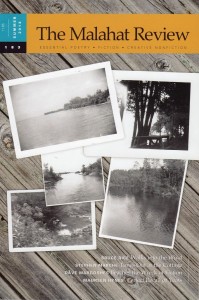
The winners of The Malahat Review‘s Long Poem Prize are Claire Caldwell for “Osteogenesis” and Kim Trainor for “Nothing is Lost.” The final judges Elizabeth Bachinsky, Dave Margoshes, and Lorri Neilsen Glenn chose these pieces among 193 entries. Finalists include Michael Prior for “Marie (I-XII),” Genevieve Lehr for “the latter half of the third quarter of the waning moon,” Kim Trainor for “When they come to that country swept with light,” Eric Folsom for “The Senryu of Solomon,” and Chad Campbell for “February Towers.
About Caldwell’s “Osteogenesis,” the judges said, it ” is a different beast altogether. This narrative poem takes place in a university town and weaves together three stories: that of two young lovers; their friend M (a medical student) and her cadaver; and the decomposition of a great blue whale. These stories, as told by a young woman to her lover, unfold like a mystery that we can never quite solve.”
And about Trainor’s “Nothing is Lost,” they said, “explores the aftermath of the Srebrenica genocide in 1995 in which thousands of Bosnian Muslims were massacred. Such profound cultural and personal loss is almost beyond language. Taking as inspiration the International Committee of the Red Cross Book of Belongings, a publication of photographs and personal effects, the poet creates an alphabet of loss, weaving images of a glove, a marble, notebook, buttons – exquisitely particular personal items – with insights into the ways artifacts themselves become saturated with human sentience.”
Click here to read more about the pieces, the judges, and the authors.
Spread the word!
Staff Members Wanted: Asymptote Journal
“Last call for 2013: Asymptote is now RECRUITING for a blog editor and a business developer among others (application deadline: 26 Aug). Don’t miss your chance to join one of the most exciting literary journals in circulation today!” For the full details click here.
Spread the word!
High School Writers
Hanging Loose 102 features 4 writers that are of the high school age: Alexa Derman, Mika Kligler, Camille Petersen, and Mia Rosenberg. This is a regular section of the magazine. Here’s a sampling of Petersen’s work, “Birds on Fire”:
Written out it would sound like
A Latin church song
Wind climbing a staircase
It would be the yell of the man
Who says he has nothing to say
But writes letters to himself on the train
Secretly prays someone will ask him
What he is doing and why he is so alone
And why his eyes look like lacquered pumice
Trying to disintegrate
The boy of the atheists who walks himself
To church has a talent for eyes
He doesn’t ask questions
He just stares . . .
Spread the word!
MUDLARK eChapbooks and More
MUDLARK: An Electronic Journal of Poetry & Poetics (“Never in and never out of print…”) offers e-chapbooks as its “issues” publication in addition to “posters: the electronic equivalent of print broadsides: and “flash poems are poems that have news in them, poems that feel like current events.” The most current issue of MUDLARK (51) is the poetry chapbook Hone Creek by Rose McLarney.
Spread the word!
Grain’s 40th Anniversary
Open to the first page of Grain Magazine‘s latest issue, and you’ll find a note that says, “If you are here for the party, please use the back door.” This issue marks their 40th Anniversary and is subtitled, “Making It.” In the editor’s note, Rilla Friesen writes, “‘Making It’ is, in one sense, about how we make our works what they are. Kyle Beal, our featured artist, writes, ‘I recently overheard a person remark at the novelty and forgotten pleasure of writing with a pencil. A timely real-life event that anecdotally affirms, or at least suggests, the notion that the act of note-leaving has become somewhat anachronistic, or at least quaint. A little like sitting down to make a drawing on a twelve-by-nine sheet of paper.’ Both Lund-Teigen and Beal prompted me to consider how writing is about making something, and we prepare the artefact that you now hold in your hands, the Grain team has made something too. And what we make is worth fighting for–literally and metaphorically.”
The issue features work by Tim Bowling, Lorna Crozier, Dorothy Field, Patrick Lane, Jeannette Lynes, rob mclennan, Jonathan Ball, Adrienne Gruber, David Carpenter, and more.
Spread the word!
2011 and 2012 Allen Ginsberg Poetry Awards
Paterson Literary Review‘s 2013-2014 issue features the winners of the Allen Ginsberg Poetry Awards for both 2011 and 2012. Here are the top winners for each:
2011 Allen Ginsberg Poetry Awards
First Prize
Christopher Bursk
Charlotte Muse
Second Prize
Mark Hillringhouse
Sander Zulauf
Third Prize
Antoinette Libro
2012 Allen Ginsberg Poetry Awards
First Prize
Dante Di Stefano
Second Prize
Donna Spector
Carole Stone
Third Prize
Jim Reese
To see a list of honorable mentions for each (also included in this issue) as well as the 2013 winners, please visit this link.

